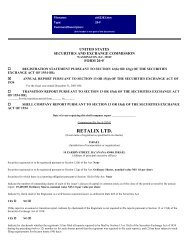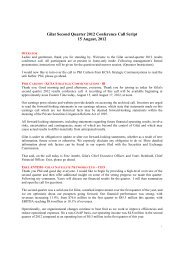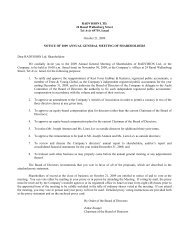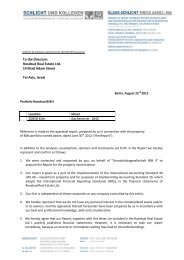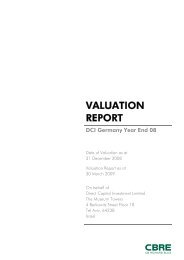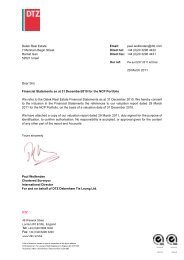XTL BIOPHARMACEUTICALS LTD.
XTL BIOPHARMACEUTICALS LTD.
XTL BIOPHARMACEUTICALS LTD.
You also want an ePaper? Increase the reach of your titles
YUMPU automatically turns print PDFs into web optimized ePapers that Google loves.
Competing Products for Treatment of Chronic Hepatitis C<br />
We believe that a certain number of the drugs that are currently under development will become available in the future for the treatment of<br />
hepatitis C. At present, the only approved therapies for treatment of chronic HCV are Interferon-based. There are multiple drugs presently under<br />
development for the treatment of HCV, most of which are in the pre-clinical or early stage of clinical development. These compounds are being<br />
developed by both established pharmaceutical companies, as well as by biotech companies. Examples of such companies are: Anadys Pharmaceuticals,<br />
Inc., F. Hoffman-LaRoche & Co., Intercell AG, Schering-Plough Corporation, Gilead Sciences, Inc., Idenix Pharmaceuticals, Inc., InterMune, Inc.,<br />
Pharmasset, Ltd., Vertex Pharmaceuticals Incorporated and Viropharma Incorporated. Many of these companies and organizations, either alone or with<br />
their collaborative partners, have substantially greater financial, technical and human resources than we do.<br />
Supply and Manufacturing<br />
Bicifadine<br />
We currently have no manufacturing capabilities and do not intend to establish any such capabilities.<br />
As part of our license agreement with DOV, we have the right to purchase certain inventories of Bicifadine that have been produced for DOV.<br />
We believe that the present Bicifadine inventories owned by DOV will be adequate to satisfy our current clinical supply needs. For further late stage<br />
trials, we intend to utilize DOV’s existing Bicifadine inventory so long as it meets the relevant specifications and quality control requirements. In the<br />
event that the inventory does not meet the proper specifications, or if DOV should fail to provide us with adequate supplies of the inventory, then we<br />
will contract with a manufacturer to supply us with our additional clinical needs. For commercial supply of Bicifadine, we intend to contract with the<br />
drug’s existing manufacturers or other drug manufacturers to produce drug supply in sufficient quantity for launch and commercialization. See “Item 3.<br />
Key Information-Risk Factors-Risks Related to Our Intellectual Property.”<br />
DOS<br />
Under the terms of the license agreement, Presidio becomes responsible for all further development and commercialization activities and costs<br />
relating to the DOS program.<br />
General<br />
At the time of commercial sale, to the extent possible and commercially practicable, we plan to engage a back-up supplier for each of our<br />
product candidates. Until such time, we expect that we will rely on a single contract manufacturer to produce each of our product candidates under<br />
cGMP regulations. Our third-party manufacturers have a limited numbers of facilities in which our product candidates can be produced and will have<br />
limited experience in manufacturing our product candidates in quantities sufficient for conducting clinical trials or for commercialization. Our thirdparty<br />
manufacturers will have other clients and may have other priorities that could affect our contractor’s ability to perform the work satisfactorily<br />
and/or on a timely basis. Both of these occurrences would be beyond our control. We anticipate that we will similarly rely on contract manufacturers<br />
for our future proprietary product candidates.<br />
We expect to similarly rely on contract manufacturing relationships for any products that we may in-license or acquire in the future. However,<br />
there can be no assurance that we will be able to successfully contract with such manufacturers on terms acceptable to us, or at all.<br />
Contract manufacturers are subject to ongoing periodic inspections by the FDA, the US Drug Enforcement Agency and corresponding state<br />
and local agencies to ensure strict compliance with cGMP and other state and federal regulations. We do not have control over third-party<br />
manufacturers’ compliance with these regulations and standards, other than through contractual obligations.<br />
If we need to change manufacturers, the FDA and corresponding foreign regulatory agencies must approve these new manufacturers in<br />
advance, which will involve testing and additional inspections to ensure compliance with FDA regulations and standards and may require significant<br />
lead times and delay. Furthermore, switching manufacturers may be difficult because the number of potential manufacturers is limited. It may be<br />
difficult or impossible for us to find a replacement manufacturer quickly or on terms acceptable to us, or at all.<br />
Government and Industry Regulation<br />
Numerous governmental authorities, principally the FDA and corresponding state and foreign regulatory agencies, impose substantial<br />
regulations upon the clinical development, manufacture and marketing of our drug candidates and technologies, as well as our ongoing research and<br />
development activities. None of our drug candidates have been approved for sale in any market in which we have marketing rights. Before marketing<br />
in the US, any drug that we develop must undergo rigorous pre-clinical testing and clinical trials and an extensive regulatory approval process<br />
implemented by the FDA, under the Federal Food, Drug and Cosmetic Act of 1938, as amended. The FDA regulates, among other things, the preclinical<br />
and clinical testing, safety, efficacy, approval, manufacturing, record keeping, adverse event reporting, packaging, labeling, storage,<br />
advertising, promotion, export, sale and distribution of biopharmaceutical products.<br />
23





